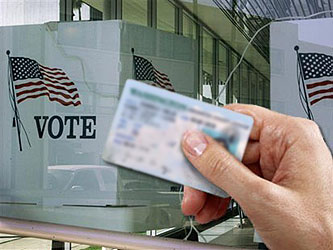 I apologize. I wrote a post the other day suggesting that there were no verified cases of in-person voter fraud over the past ten years, but a new study shows that I was wrong:
I apologize. I wrote a post the other day suggesting that there were no verified cases of in-person voter fraud over the past ten years, but a new study shows that I was wrong:
The analysis of 2,068 reported fraud cases by News21, a Carnegie-Knight investigative reporting project, found 10 cases of alleged in-person voter impersonation since 2000. With 146 million registered voters in the United States, those represent about one for every 15 million prospective voters….One of the instances of voter impersonation fraud occurred in Londonderry, N.H., in 2004 when 17-year-old Mark Lacasse used his father’s name to vote for George W. Bush in the Republican presidential primary. Lacasse’s record was cleared after he performed community service.
So there you have it. One alleged case per year. That may not seem like much, but in the LA Times today, Stephan and Abigail Thernstrom say that doesn’t matter:
Without a personal identification card issued by some level of government, you are a second-class citizen. You cannot board an airplane, ride an Amtrak train, buy a six-pack of beer or a pack of cigarettes, open a checking account, enter many public and some private office buildings or even attend an NAACP convention without proving that you are who you say you are.
….These requirements have provoked strikingly little objection from the American public. No one argues that it is grossly discriminatory to deprive people without picture IDs access to this wide range of places, programs and activities.
Those of you who aren’t Thernstroms might think that “second class citizen” is an unfortunate turn of phrase when it comes to voting rights. Perhaps voting is a wee bit different from being able to buy a six-pack of beer? The Thernstroms acknowledge this, but then brush it away with the casual observation that “rights are not absolute.”
But that’s not all! I had to blink a couple of times to make sure they actually said what it looked like they said at the end of their piece, but they did indeed say this:
If, indeed, the voter ID laws inspire drives to register citizens and get them to the polls (and get them photo IDs), won’t America be better off? More people will gain the freedom to watch an argument in a court of law, board a train or a plane, and even buy a bottle of Scotch. Democracy will have been enhanced. Sensible civil rights advocates might consider that, and join the drive for ID laws.
That’s the latest argument for voter ID laws? That they’re really just a big-hearted attempt to get our marginally-attached citizenry more solidly attached to society and therefore more likely to vote? Seriously?

















